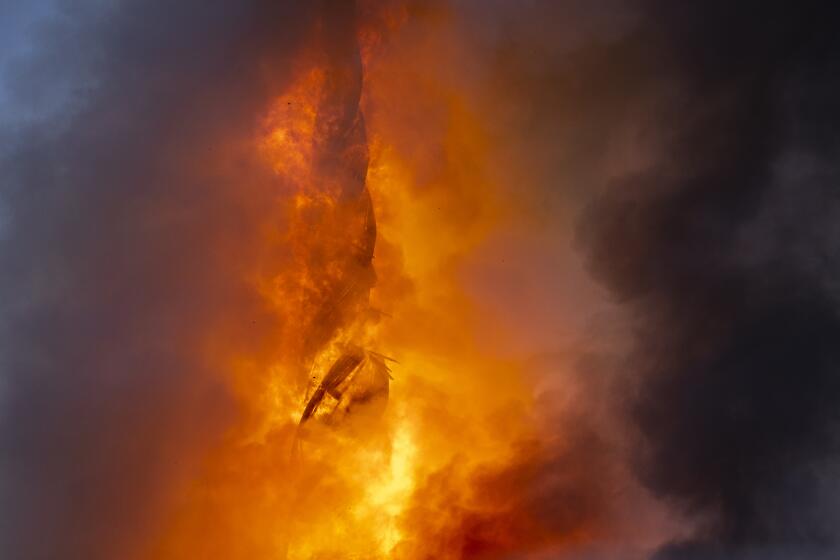U.S. Issues a List of the Shortcomings in Iraqi Arms Declaration
WASHINGTON -- Moving to support charges that Iraqi President Saddam Hussein is building banned weapons, the Bush administration for the first time released a list of its chief concerns Thursday and will begin providing classified intelligence to U.N. weapons inspectors.
A one-page State Department fact sheet, issued after Secretary of State Colin L. Powell accused Iraq of lying, lists what Washington considers the key omissions and deceptions in Baghdad’s Dec. 7 weapons declaration to the United Nations Security Council.
The U.S. list notes Iraqi claims that suspected mobile germ warfare laboratories -- what some U.S. officials call “the Winnebagos of Death” -- are really “refrigeration vehicles and food-testing laboratories.”
The list also says that Baghdad did not explain its effort to buy uranium in the African nation of Niger. A British intelligence report in October revealed that Iraq had secretly tried to buy uranium in Africa, but it did not identify the country.
Iraq has no civilian nuclear power or research reactors, and thus no apparent need for uranium other than as fuel for nuclear weapons. The Iraqi declaration, U.N. officials said, also did not explain Baghdad’s covert attempts to procure 60,000 specialized aluminum tubes. The CIA believes that the tubes would have been used in gas centrifuges to enrich uranium.
The State Department paper also cites the following gaps or concerns in Iraq’s declaration:
* Iraq does not account for 4,752 pounds of special nutrient material that U.N. inspectors believe was imported before 1995. The material could have been used to produce 6,760 gallons of anthrax, triple the amount that declared by Iraq, as well as other germ agents. U.S. officials say they don’t know if Iraq produced biological weapons in those quantities.
* Iraq disclosed manufacturing fuels suited only to a class of long-range missile that it does not admit owning. Iraq also asserts that a new “larger diameter” missile does not exceed a 94-mile flight limit imposed by the U.N. “This claim is not credible,” the U.S. report says.
* Iraq does not provide additional and credible details about production of the deadly nerve agent VX. In 1998, Iraq declared 3.9 tons of VX, but U.S. and U.N. experts believe that it produced much more, including at least some that could be used in weapons.
* Iraq does not provide evidence to support previous claims that it destroyed 550 artillery shells filled with mustard gas and 400 aerial bombs capable of delivering biological weapons.
* Iraq does not adequately account for hundreds, possibly thousands, of tons of chemical precursors -- which can be combined to create chemical weapons -- or of nearly 30,000 empty munitions that could be filled with chemical agents.
* Iraq denies any connection between its efforts to build drone aircraft and its chemical or biological weapons programs. But Iraq admitted in 1995 that a MIG-21 remote-controlled plane tested in 1991 was intended to carry a biological weapons spray system.
“None of these holes and gaps in Iraq’s declaration are mere accidents, editing oversights or technical mistakes: They are material omissions,” the U.S. fact sheet concludes.
Raymond Zilinskas, a former U.N. inspector who now heads the chemical and biological weapons nonproliferation program at the Monterey Institute of International Studies in California, said Iraq’s biological weapons program requires the most explanation.
“The biggest gaps are how much did they produce, and what happened to it,” he said. “They need to document what they destroyed, plus how and where.”
U.S. officials said they would begin giving limited intelligence to U.N. arms inspectors. The decision came after U.N. officials and some U.S. allies complained that Washington was refusing to provide evidence for its claims that Iraq is developing nuclear, chemical and biological weapons.
“We’ll give them places to look, things to look for, questions to ask,” a U.S. intelligence official said of the inspection teams.
Russia’s ambassador to the U.N., Sergei V. Lavrov, suggested that U.S. intelligence may be crucial if the Bush administration is to convince other Security Council members that Hussein is lying.
“We have been hearing allegations that Iraq does continue its [weapons of mass destruction] programs,” he told reporters at the U.N. “We’ve heard it many times. We’ve never seen any evidence. We don’t know if it’s true or not.”
*
(BEGIN TEXT OF INFOBOX)
State Department responds
Examples of omissions from Iraq’s weapons declaration, according to the U.S. State Department:
Anthrax and other biological agents
The U.N. Special Commission concluded that Iraq did not verifiably account for, at a minimum, 2,160 kilograms of growth media. This is enough to produce 26,000 liters of anthrax -- three times the amount Iraq declared; 1,200 liters of botulinum toxin; and 5,500 liters of clostridium perfrigens -- 16 times the amount Iraq declared.
*
Ballistic missiles
Iraq has disclosed manufacturing new energetic fuels suited only to a class of missile to which it does not admit.
Iraq claims that flight testing of a larger diameter missile falls within the 150-kilometer limit. This claim is not credible.
*
Nuclear weapons
The declaration ignores efforts to procure uranium from Niger.
*
Chemical and biological weapons munitions
In January 1999, the U.N. Special Commission reported that Iraq failed to provide credible evidence that 550 mustard gas-filled artillery shells and 400 biological weapon-capable aerial bombs had been lost or destroyed. The Iraqi regime has never adequately accounted for hundreds, possibly thousands, of tons of chemical precursors.
*
Mobile biological weapon agent facilities
The Iraqi declaration provides no information about its mobile biological weapon agent facilities. Instead, it insists that these are “refrigeration vehicles and food testing laboratories.”
Source: U.S. State Department
More to Read
Start your day right
Sign up for Essential California for news, features and recommendations from the L.A. Times and beyond in your inbox six days a week.
You may occasionally receive promotional content from the Los Angeles Times.







